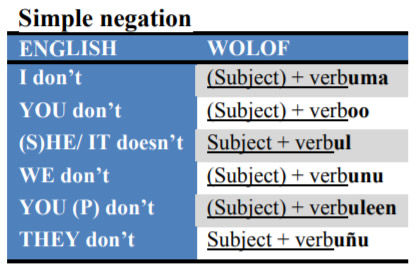Difference between revisions of "Language/Wolof/Grammar/Simple-negation"
Jump to navigation
Jump to search
m (Quick edit) |
|||
| Line 15: | Line 15: | ||
==Source== | ==Source== | ||
http://publish.illinois.edu/wolof201fall14/files/2014/08/NEW_WOLOF_BOOK.pdf | http://publish.illinois.edu/wolof201fall14/files/2014/08/NEW_WOLOF_BOOK.pdf | ||
==Related Lessons== | |||
* [[Language/Wolof/Grammar/Possessive-pronouns|Possessive pronouns]] | |||
* [[Language/Wolof/Grammar/Nouns|Nouns]] | |||
* [[Language/Wolof/Grammar/Questions|Questions]] | |||
* [[Language/Wolof/Grammar/Gender|Gender]] | |||
* [[Language/Wolof/Grammar/The-possessive-expressed-by-“U”|The possessive expressed by “U”]] | |||
* [[Language/Wolof/Grammar/Conditional-Mood|Conditional Mood]] | |||
* [[Language/Wolof/Grammar/Future-Tense|Future Tense]] | |||
* [[Language/Wolof/Grammar/Conditional|Conditional]] | |||
* [[Language/Wolof/Grammar/Static-verbs|Static verbs]] | |||
Revision as of 13:36, 26 February 2023
Simple Negation in Wolof
Formulas
Examples
- Amuma xaalis, wolonteer laa I don’t have money, I’m a volunteer
- Bëgguma jëkkër ci Senegal I don’t want a husband in Senegal.
- John déggul Wolof bu baax wante mungiy jàng. John doesn’t understand Wolof well but he’s learning
Notes
- The simple negation pronouns are used to conjugated any type of verb in Wolof (ID, action and static verbs) in the present tense.
Source
http://publish.illinois.edu/wolof201fall14/files/2014/08/NEW_WOLOF_BOOK.pdf

